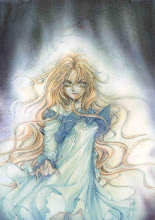It is when the sea sparkles in the sun that I believe,
It is when the rose blooms that I believe,
It is when the sun rises that I believe
That You are more beautiful than creation itself.
When the stars glitter I see you eyes,
When the nightangle sings I see your smile,
In the rising dawn, i feel your prescence.
You are forever there in my soul.
In the cacophany of the world dungeon,
Your voice sings out like an angel's smile.
In the glory of the crimson sunset,
I remmeber how blessed I am.
That you are here ...before my eyes.
Subscribe to:
Post Comments (Atom)

1 comment:
This poem begins with the first stanza listing three beautiful occurrences of nature transpiring. This list needs little elaboration because the narrator is commonly accepted images of beauty that can have quickly understood images in the mind of the reader. The narrator then states how “You” transcends these in beauty. The narrator is trying used the first three images in an attempt to say that while those things are beautiful, “You” transcend those and are beyond such things in creation.
In the next stanza the narrator again uses phenomenon of nature to express how all these things that are seen so beautiful on a day to day basis, are but mere echoes of the beauty inherent in the narrator’s view of his/her love.
The third stanza begins with a grimmer remark by joining the words “world” and “dungeon” together, which would imply to me that the narrator views the world as such a miserable place. And yet the “cacophony” or chaos of this place is nullified by the calming presence of the narrator’s love. (I would like to note know that I am aware that at no point in poem is the word ‘love’ used, yet the feeling of love is prevalent I cannot assume anything else. If this is meant to be a poem concerning love, than it succeeded installing that idea in the reader without ever saying it explicitly.) After that is stated, the narrator likens the sunrise to the essence of “You” and plainly states that this being is always apart of his/her self.
The poem finally ends with the narrator relating how fortunate he/she is that the object of their love is right in front of them.
Initially, I was put off by this poem for it’s over-simplistic nature. However, the use of nature to show how far and above the feelings of the narrator ascend in regards to their affection is a very successful technique. Also, I simply liked that one line, “In the cacophony of the world dungeon,”. It just rang for me.
The poem however ended at a somewhat mysterious note in regards to how it implied that what the narrator loved was right in front of him. One could simply believe that this is the narrator talking to his/her love in person. However, I would like to think that the narrator’s beloved is not with him in person, but is altogether gone yet the beauty of nature reminds the narrator so much of him/her that this person may just as well be there.
Necessarily, I did and did not enjoy this poem more than the others. It’s construction was more poem like, but there was no actually need to construct it into stanzas when there was no actually rhyming or meters being kept. It had good imagery, yet had an overall sappy tone that hurt at some points. It was much more accurate in message and vision than some previous and yet it also lacked rawer imagination.
What Im getting at is that I think it’s important for there to be more description in your poetry, so that way the reader can be more mentally invested in what the narrator is discussing. This poem had much more description than others and that is why I liked.
Post a Comment